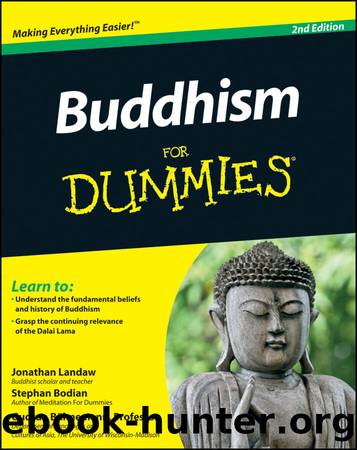Buddhism for Dummies by Jonathan Landaw & Stephan Bodian

Author:Jonathan Landaw & Stephan Bodian
Language: eng
Format: epub
Tags: Philosophy, Spirituality, Religion
ISBN: 9781118023792
Publisher: For Dummies
Published: 2002-12-01T00:00:00+00:00
Far from establishing an absolute standard of right and wrong, ethical guidelines in Buddhism have an entirely practical purpose: to keep practitioners focused on the goal of their practice, which is a liberating insight into the nature of reality. During his 45 years of teaching, the Buddha found that certain activities contributed to increased craving, attachment, restlessness, and dissatisfaction, and led to interpersonal conflict in the community at large. By contrast, other behaviors helped keep the mind peaceful and focused, and contributed to a more supportive atmosphere for spiritual reflection and realization. From these observations, not from any abstract moral point of view, the ethical guidelines emerged.
Examining your life through meditation
In the popular imagination, Buddhism is definitely the religion of meditation. After all, who hasnât seen statues of the Buddha sitting cross-legged, eyes half closed, deeply immersed in spiritual reflection; or picked up one of the many titles available these days devoted to teaching the basics of Buddhist meditation?
But many people misunderstand the role meditation plays in Buddhism. They falsely assume that youâre meant to withdraw from the affairs of ordinary life into a peaceful, detached, and unaffected inner realm until you no longer feel any emotion or concern about the things that once mattered to you. Nothing could be farther from the truth. (We cover other misconceptions about Buddhism and Buddhist practice in Chapter 16.)
According to several Buddhist schools, the main purpose of meditation isnât to calm the mind (though this result may happen and is certainly conducive to the meditative process), nor is it to become uncaring. Instead, the purpose is to experience the profound and ultimately liberating insight into the nature of reality and yourself that we talk about in the section âUnderstanding the Function of Philosophy in Buddhism,â earlier in this chapter â an insight that shows you who you are and what life is about and frees you from suffering once and for all. (For more on this insight, known as spiritual realization or enlightenment, see Chapter 10.)
Meditation facilitates this insight by bringing focused, ongoing attention to the workings of your mind and heart. In the early stages of meditation, you spend most of your time being aware of your experience as much as you can â an almost universal Buddhist practice known as mindfulness. You may also cultivate positive, beneficial heart qualities like loving-kindness and compassion or practice visualizations of beneficial figures and energies. But in the end, the goal of all Buddhist meditation is to find out who you are and thereby end your restless seeking and dissatisfaction. (For more on meditation, see Chapter 7.)
Practicing devotion
Devotion has long been a central Buddhist practice. No doubt it began with the spontaneous devotion the Buddhaâs own followers felt for their gentle, wise, and compassionate teacher. After his death, followers with a devotional bent directed their reverence toward the enlightened elders of the monastic community and toward the Buddhaâs remains, which were preserved in burial monuments known as stupas (see Chapter 4 to find out more about the stupas).
Download
This site does not store any files on its server. We only index and link to content provided by other sites. Please contact the content providers to delete copyright contents if any and email us, we'll remove relevant links or contents immediately.
| Anthropology | Archaeology |
| Philosophy | Politics & Government |
| Social Sciences | Sociology |
| Women's Studies |
Born to Run: by Christopher McDougall(7116)
The Leavers by Lisa Ko(6942)
iGen by Jean M. Twenge(5401)
Sapiens by Yuval Noah Harari(5358)
Spare by Prince Harry The Duke of Sussex(5172)
The Kite Runner by Khaled Hosseini(5159)
Machine Learning at Scale with H2O by Gregory Keys | David Whiting(4289)
Bullshit Jobs by David Graeber(4176)
Never by Ken Follett(3928)
Goodbye Paradise(3795)
Livewired by David Eagleman(3757)
Fairy Tale by Stephen King(3364)
A Dictionary of Sociology by Unknown(3065)
Harry Potter 4 - Harry Potter and The Goblet of Fire by J.K.Rowling(3052)
The Social Psychology of Inequality by Unknown(3013)
The Club by A.L. Brooks(2917)
Will by Will Smith(2898)
0041152001443424520 .pdf by Unknown(2841)
People of the Earth: An Introduction to World Prehistory by Dr. Brian Fagan & Nadia Durrani(2722)
